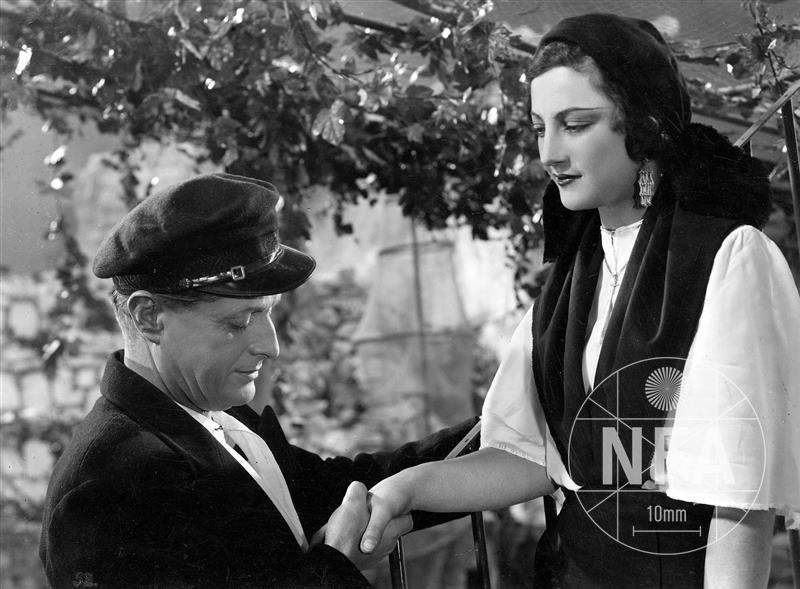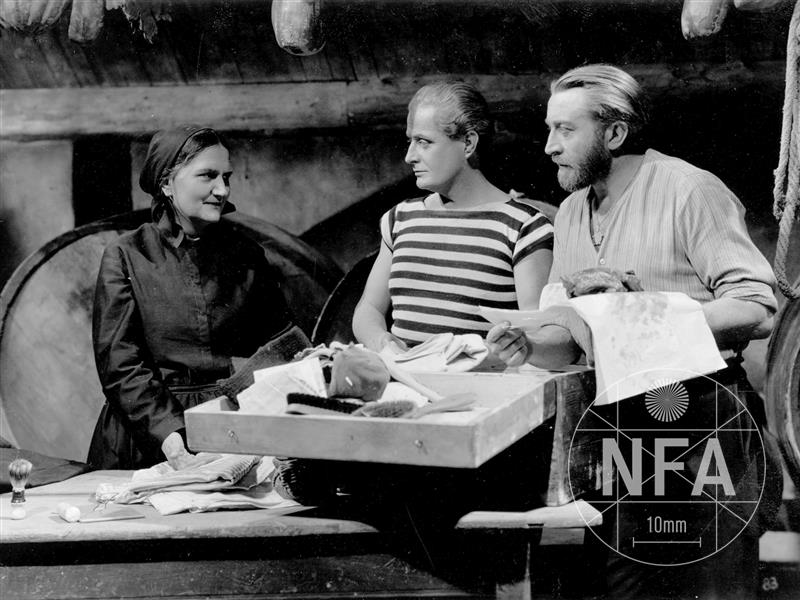...and Life Goes On...
Country
CzechoslovakiaCopyright
1935Production year
1933—1935Premiere
18 October 1935Runtime
82 minDirector
Carl Junghans (exteriéry 1933 a 1934), F. W. Kraemer (dokončení 1935), Václav Kubásek (česky mluvené scény a české interiéry 1935)Category
filmGenre
dramaTypology
featuretheatrical distributionlongOriginal title
...a život jde dál...Czech title
...a život jde dál...English title
...and Life Goes On...Working title
Ztracený syn / A život jde dál...Synopsis
On the coast of Yugoslavia lives fisherman Ivo Kralj, his wife Marie, son Vuk, and Ivo's mother in one happy home. Marie, who loves her husband and always looks forward to his return from sea, attracts Nikola, with whom Ivo, out of jealousy, has a scuffle at a dance. After the outbreak of World War I Ivo is mobilized. He ends up in a P.O.W. camp where he is subjected to hard labour. His family then receives news of his death. The years pass and the lonely widow Marie is occasionally visited by her friend Nikola. Ivo's mother would like her to remarry. Soon after the wedding Marie becomes pregnant. Ivo, who has been thought dead, succeeds in escaping the P.O.W. camp where he has spent several years. Upon his arrival home he finds his name on a memorial erected to the victims of the war. He meets his son, who does not recognize him. Ivo searches for his mother and reproaches her for not preventing Marie's wedding. He goes away again in sorrow. Marie gives birth to a beautiful child and Nikola is a proud father. Life goes on...
Note
Starfil began shooting the film in 1933 under the title The Lost Son. After shooting several scenes in Yugoslavia the Paříž-Praha company took over production with backing of the Ministry of Foreign Affairs. Carl Junghans yielded as director and the Austrian F. W. Kraemer finished the film in 1935. The Czech-speaking scenes and the Czech interiors were directed by Václav Kubásek. In total, the film was shot in four separate language versions, in Czech, German, French and Serbo-Croatian. The film was presented at the 3rd Venice Film Festival, 1935.
Cast
L. H. Struna
rybář Ivo Kralj
Ita Rina
Marie Kraljová, Ivova žena
Zlata Dryáková
Voice by Pavla Stolzová
Kraljová, Ivova matka
Zvonimir Rogoz
rybář Nikola, Ivův přítel
Schidloff
Vuko Kralj, Ivův syn
Jaroslav Bráška
úředník okresního hejtmanství
F. X. Mlejnek
hostinský
Bohdan Lachman
krčmář
Miroslav Svoboda
šílenec v zajateckém táboře
Gina Hašler
poddůstojník v zajateckém táboře
Jaroslav Tryzna
dozorce v zajateckém táboře
Josef Bunzl
četník
Antonín Frič
symbol soudnictví
Věkoslav Satoria
námořník
Joca Popović
námořník
Frank Rose-Růžička
námořní důstojník v zajateckém táboře
Leopold Horešovský
Ivův druh v zajateckém táboře
Marie Häusslerová
žena u mobilizační vyhlášky
Vlasta Strunová
venkovanka
T. Lubiński
člen posádky ponorky
P. Marković
člen posádky ponorky
dr. Heller
Dubbing
Robert Ford
hlas lékaře
Josef Bunzl
hlas dozorce v zajateckém táboře
Crew and creators
Director
Carl Junghans (exteriéry 1933 a 1934), F. W. Kraemer (dokončení 1935), Václav Kubásek (česky mluvené scény a české interiéry 1935)
Screenstory
Screenplay
Director of Photography
Jaroslav Blažek (exteriéry 1933), Jan Stallich (exteriéry 1933 a 1934), Harry Smeh (exteriéry 1934 a 1935), Otto Heller (interiéry 1935)
Production Designer
Set Designer
Film Editor
Sound Designer
Production Manager
Unit Production Manager
Cooperation
Antonín Frič (fotograf)
Music
Music Composed by
Music Performed by
Orchestr F.O.K. (Music Conducted by Josef Dobeš)
Singer
Pěvecký sbor Lumír, Ita Rina, L. H. Struna [dab], F. X. Mlejnek
Production info
Original Title
...a život jde dál...
Czech Title
...a život jde dál...
English Title
...and Life Goes On...
Working Title
Ztracený syn / A život jde dál...
Category
film
Typology
featuretheatrical distribution
Genre
drama
Origin country
Czechoslovakia
Copyright
1935
Production Year
1933—1935
Production specifications
start of filming 8 April 1935 (ateliéry)
end of filming 23 April 1935 (ateliéry)
date of censorship 09/1935
Premiere
premiere 18 October 1935 /inaccessible for youths/ (kino Fénix /1 týden/, Praha)
Production
Praha-Paříž (exteriéry 1934 a 1935, interiéry 1935), Starfilm (exteriéry 1933)
With support
Copyright Holders
Studio
Distribution
Technical info
Duration typology
feature film
Duration in minutes
82 min
Original length in metres
2 440 meters
Distribution carrier
35mm
Aspect ratio
1:1,19
Colour
black & white
Sound
sound
Sound system/format
Tobis – Klang
Versions
Czech
Dialogue languages
Czech
Subtitles languages
without subtitles
Opening/End credits languages
Czech
Awards
Vítěz
Festival: 3. mezinárodní filmový festival Benátky
1935
Benátky / Italy





